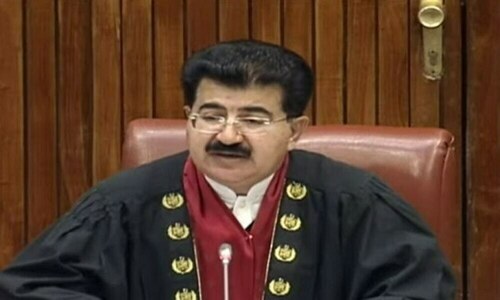ISLAMABAD, : The Senate on Friday adopted a resolution calling for the postponement of general elections scheduled for February 8 in order to facilitate the effective participation of people across the country in the electioneering process in view of security and harsh weather conditions.
The resolution, moved by independent Senator Dilawar Khan, was passed by the House with a majority vote. However, there was low attendance.
Caretaker Federal Minister for Information, Broadcasting and Parliamentary Affairs Murtaza Solangi and Senator Afnan Ullah Khan of the Pakistan Muslim League-Nawaz (PML-N) opposed the resolution.
Senator Dilawar, while presenting the resolution, urged the chair to postpone the agenda for taking up the matter of serious concern. He read out the resolution, which maintained that the Constitution of Pakistan “upholds the right to vote for every citizen of Pakistan.”
The resolution read: “The constitutional duty assigned to the Election Commission of Pakistan to conduct free and fair elections is contingent upon inclusivity and ensuring the participation of all regions and people.
“The voter turnout in colder areas remains notably high during moderate weather conditions; January and February are recognized as the coldest months in a majority of the areas of Balochistan and Khyber Pakhtunkhwa.
“Various groups and political parties have expressed significant reservations regarding anticipated difficulties in ensuring the participation of residents in cold areas during the electioneering process.”
It noted that the recent incidents, including the foiled attempts on the lives of Jamiaat Ulema-e-Islam-Fazl (JUI-F) chief Maulana Fazlur Rehman and former MNA Mohsin Dawar, as well as threatening calls targeting Awami National Party’s Provincial Chief Aimal Wali Khan and other political figures, had raised concerns about the safety of political leaders.
“The Ministry of Interior has convoyed serious threats to the lives of prominent politicians, further exacerbating the challenges faced by political parties in exercising their right to free and fair election campaigning,” the resolution added.
There had been a marked increase in attacks on security forces and citizens claiming precious lives particularly in northwestern Khyber Pakhtunkhwa and Balochistan provinces, it further said.
The resolution read: “The intelligence agencies have warned of militant attack threats on election rallies in the two provinces; increase in attacks targeting both security forces and civilians, resulting in the loss of valuable lives, particularly in the northwestern region of Khyber Pakhtunkhwa and Balochistan provinces;
“Alerts issued by intelligence agencies, indicating imminent threats of militant attacks on election rallies within the aforementioned provinces may have potential impact on the safety of citizens and the democratic electoral process;
“Cognizant of the resurgence of the Covid-19 virus in the country and health sector’s concerns about potential further spread;
“Reaffirms that while holding the judgment of the Honourable Supreme Court of Pakistan regarding the elections date in the highest esteem for the Upper House of the Parliament, the Senate of Pakistan, being the defender of the rights of all federating units, is obligated to ensure the constitutional guarantees and to alleviate fears of the smaller provinces especially vulnerable geographical territories.
“The Senate of Pakistan hereby resolves that conducting elections without addressing legitimate concerns, facilitating sufficient opportunities for election campaigns, and guaranteeing the safety of politicians and citizens would amount to a violation of the fundamental right to vote and political participation, as safeguarded by the Constitution of Pakistan;
“The elections scheduled for 8th February 2024 may be postponed to facilitate the effective participation of people from all areas of Pakistan and belonging to all political shades in the electioneering process. This delay aims to protect and uphold their constitutional right to political participation;
“The Election Commission of Pakistan is urged to promptly implement the postponement and ensure that all necessary arrangements are in place to facilitate the smooth conduct of elections on the revised date;
“The process of filing of nomination papers and scrutiny shall continue with the revised/extended timelines;
“The Election Commission of Pakistan shall engage proactively with relevant stakeholders, political parties, and communities in to address their concerns and foster an environment conducive to free and fair elections.
“The Senate of Pakistan expresses confidence in the ability of the Election Commission of Pakistan to effectively manage and oversee the revised election schedule, ensuring the integrity and fairness of the electoral process.”
Opposing the resolution, Senator Afnanullah said though the current security situation in the country was not good but the elections could not be delayed on that count. The polls were held in 2008 and 2013 despite worst conditions then.
Moreover, two general elections in the past had been held in the month of February, he added.
Afnanullah questioned whether the country of 240 million people could be run without constitutional institutions. The mover probably “don’t want a parliament in the country”, he added.
The United Kingdom and the United States had not deferred elections even during the World War II, but here weather conditions were being cited as an excuse to delay the polls, he regretted.
Some elements wanted delay of elections for their “personal benefits”, he added.
Speaking in the House, independent Senator Hidayatullah said that he had got registered nine first information reports in the past two weeks against threats he had been receiving.
“The provincial candidate of the JUI-F escaped a bomb blast yesterday,” he added.
Balochistan Awami Party’s Senator Manzoor Ahmed Kakar supported the resolution, saying that both security and economic conditions in the country had worsened over time.
Senator Kauda Babar said elections could not be held in many parts of the country because of extreme weather conditions in February.
Later, the session was prorogued sine die after passage of the resolution.



Comments are closed.